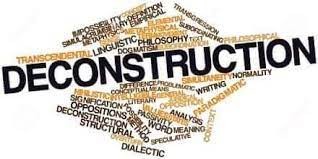
Deconstruction Theory: Unraveling the Fabric of Language and Meaning
Deconstruction theory, a prominent intellectual movement in the realm of literary and philosophical analysis, challenges conventional perceptions of language, meaning, and interpretation. Coined by the French philosopher Jacques Derrida in the mid-20th century, deconstruction seeks to expose the intricate layers of hidden assumptions embedded within texts, ultimately deconstructing and redefining our understanding of reality.
At its core, deconstruction resists the notion of a fixed or singular meaning within a text. Instead, it suggests that every text harbors a multiplicity of interpretations, and the process of deconstruction involves unpacking these varied layers to expose underlying contradictions and complexities. Derrida famously stated, "There is no outside-text," highlighting that meaning is not isolated within the words on a page but is entangled in a web of language, culture, history, and individual perspectives.
Deconstruction challenges the traditional binary oppositions that structure language and thought, such as presence/absence, speech/writing, and reality/appearance. By blurring these boundaries, deconstruction reveals the instability of language and the inherent play of differences that constitute meaning. This notion is exemplified in Derrida's examination of the concept of "différance," a portmanteau of "difference" and "deferment," which illustrates how meaning is both deferred and differentiated, leading to an endless chain of signification.
One of the fundamental aspects of deconstruction is its emphasis on the interplay between what is said (the explicit content) and what is unsaid (the implicit assumptions). Deconstructionists examine how language often relies on hierarchical structures and binary oppositions, which can marginalize certain viewpoints or reinforce power dynamics. Through deconstruction, these biases are exposed, challenging the prevailing norms and inviting a more inclusive and nuanced understanding.
Deconstruction theory has far-reaching implications beyond the realm of literature. It has influenced fields such as philosophy, linguistics, architecture, and cultural studies. In architecture, for instance, the idea of deconstruction is manifested in buildings that challenge traditional forms, embracing fragmentation and disintegration as a statement against uniformity.
Critics of deconstruction argue that its rejection of fixed meaning can lead to relativism and the undermining of objective truths. However, proponents contend that deconstruction does not dismiss meaning altogether but rather highlights the fluid and dynamic nature of interpretation.
In conclusion, deconstruction theory is a thought-provoking intellectual movement that challenges our assumptions about language, meaning, and reality. By unraveling the complexities inherent in texts, deconstructionists invite us to question, explore, and engage with the multifaceted layers of human expression. As we navigate a world of shifting perspectives and evolving paradigms, deconstruction remains a powerful tool for uncovering the intricate tapestry of language that shapes our understanding of the world